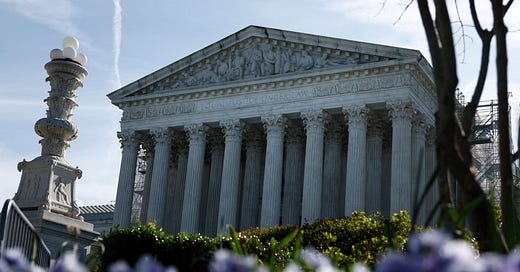Administrative Creep on the Chopping Block
Why the Supreme Court’s decision on Chevron Deference matters.
(Photo by Anna Moneymaker/Getty Images)
A busy US Supreme Court dropped yet another jurisprudential bomb in the recent case of Loper Bright Enterprises v. Raimondo, which reversed the longstanding precedent of Chevron USA, Inc. v. Natural Resources Defense Council, Inc. The 1984 Chevron decision served as a four-decade foundation for judicial “deference” (essentially, the benefit of the doubt) when reviewing administrative regulations and actions by government agencies. Liberal voices protest that Chevron’s reversal will undermine science and restrict agencies’ ability to fulfill legislative directives; conservatives hail the decision as an overdue constraint of runaway administrative technocracy. Loper has shifted the legal landscape going forward: here’s how.
Ending Chevron Deference
Chevron and its legal progeny granted agency deference in ambiguous situations as long as the agency’s interpretation of a legislative mandate was reasonable, chiefly to formal agency documents or regulations that have the force of law and were subject to “notice and comment” processes in their creation; less formal documents, including letters, were afforded less deference. Loper upended this scheme entirely, ruling that the judiciary has an obligation to interpret laws and not simply defer to executive or legislative branch implementations as has been done under Chevron.
Loper addresses objections by family herring fishing businesses impacted by fees imposed by the National Marine Fisheries Service (NMFS) to cover the costs of observers, estimated by NMFS to be $710 per day, “reducing annual returns to the vessel owner by up to 20 percent.” The District Court and D.C. Circuit Court below both ruled in the government’s favor, citing Chevron deference. The Loper majority reversed the lower courts – and Chevron as well.
While election-year ideological clamor from the left accuses the Court of playing politics, the restraints of Loper would equally restrict a Trump administration from using federal agencies to target enemies or expand administrative powers without the consent of the governed. The importance of science and technical knowledge is employed as a rallying cry by the left, yet government agencies rich in expertise are not immune from partisan and ideological agendas. The Court’s lengthy opinion pretty well excoriated Chevron, finding it “has proved to be fundamentally misguided,” “has launched and sustained a cottage industry of scholars attempting to decipher its basis and meaning,” “was a judicial invention that required judges to disregard their statutory duties,” and “a ‘rule in search of a justification,’ …if it was ever coherent enough to be called a rule at all.”
In a similarly spicy dissent, Justice Elena Kagan condemned the reversal of Chevron:
“A rule of judicial humility gives way to a rule of judicial hubris. In recent years, this Court has too often taken for itself decision-making authority Congress assigned to agencies. The Court has substituted its own judgment on workplace health for that of the Occupational Safety and Health Administration; its own judgment on climate change for that of the Environmental Protection Agency; and its own judgment on student loans for that of the Department of Education. … But evidently that was, for this Court, all too piecemeal. In one fell swoop, the majority today gives itself exclusive power over every open issue—no matter how expertise-driven or policy-laden—involving the meaning of regulatory law. As if it did not have enough on its plate, the majority turns itself into the country’s administrative czar.”
What Loper Says
The Loper majority, however, found that the courts had abdicated their duty under the Administrative Procedures Act by too easily deferring to government agencies:
“Chevron’s fictional presumption of congressional intent was always unmoored from the APA’s demand that courts exercise independent judgment in construing statutes administered by agencies. At best, our intricate Chevron doctrine has been nothing more than a distraction from the question that matters: Does the statute authorize the challenged agency action?”
Contrary to Justice Kagan’s alarmist claims that courts will now substitute judicially crafted policy for that of experts and scientists, Loper simply requires courts to more closely scrutinize government action for legitimacy. The Loper majority noted the expansion of federal regulatory creep under the New Deal; the American people have witnessed executive branch overreach in student loans, the CIA, FDA, CDC, FBI, and other agencies. Liberty Nation News has reported of EPA regulations of waterways historically not subject to federal jurisdiction; EPA wildlife regulations that burden farmers; EPA tailpipe emission standards that regulate entire fleets rather than individual vehicle models; changes to SEC rules for climate (not financial) reporting; and race-based distribution of benefits by the USDA.
Restoring Balance
Many view the federal government as having long been permitted too much deference. Little noticed in the Loper case (and unmentioned by Justice Kagan) is that the fishing families being billed for business-killing “observer” fees were not likely intended to be burdened in this way by Congress. The majority noted in its discussion of the Circuit Court decision:
“In dissent, Judge Walker concluded that Congress’s silence on industry funded observers for the Atlantic herring fishery—coupled with the express provision for such observers in other fisheries and on foreign vessels—unambiguously indicated that NMFS lacked the authority to “require [Atlantic herring] fishermen to pay the wages of at-sea monitors.”
Ironically, Justice Kagan was nominated to the US Supreme Court by Barack Obama to replace Justice John Paul Stevens, author of the original Chevron decision. In her deference to Chevron‘s shaky legacy, Kagan expresses more trust in the executive and legislative branches than the Framers and Constitution envisioned. Many observers have hailed Loper for restoring judicial oversight of the other government branches at a time when the nation’s balance of powers has become wobbly.
Following the reversal of Chevron, government agencies may be more circumspect when they issue regulations. This will hardly shut down the government, and will hopefully restrain bureaucratic agencies from appropriating cart blanche authority to themselves never granted by Congress.
(Originally published at Liberty Nation.)





